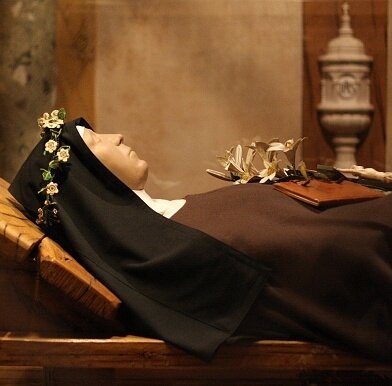August 11 is the feast day of St Clare of Assisi. The Revd Dr Chris Dingwall-Jones writes about her theology of poverty. Fr Chris is Chaplain of Jesus College, Oxford.
All tagged saint
St Mary Magdalen: Apostle to the Apostles
Today—July 22—is the feast of St Mary Magdalen, our saintly patron. We have her in mind often, when we are putting material together for this site and for our books. Regular readers probably skip the front page of the website now, but it is a good time to revisit something Rowan Williams said to us when we launched the School of Theology […]
St Patrick: Patron Saint of Ireland
Quite unlike George, Patron Saint of England (among other places), Patrick—Pádraig—was a Briton, probably born in the latter days of Roman authority in Britain or a decade or two afterwards in the early 5th century: his exact dates are much disputed. In his own Confessio, he tells us that his father Calpornius was a deacon who possessed an estate nearby, and that his grandfather a priest called Potitus. […]
St Valentine: Highly Dubious
Saint Valentine is by tradition a third-century Roman saint and martyr whose cult was only established by Pope Gelasius I in AD 496 amongst those “whose names are justly reverenced amongst men, but whose acts are known only to God”. He is included in the Martyrologium Hieronymianum (460-544 CE), and the sparse information which may have some element of reliability seems to be no earlier than the fifth century. He would, in fact, seem to have been the conflation of two saints […]
St Albert the Great: Patron Saint of Scientists
The Church has a patron saint of natural scientists, though I confess that I have never availed myself of his intercession. Albert—called Magnus (the Great) even during his lifetime—is now best known as Thomas Aquinas’s teacher and defender, but as the Church celebrates his feast on November 15th, we have an excellent excuse to learn a little more about his own life and work. […]
St Luke: Beloved Physician
The author of one of the three canonical gospels, St Luke the Evangelist, sometimes affectionately called The Angelic Doctor, is celebrated on October 18th. He is one of the most prolific writers in the New Testament writing the longest gospel but also having The Acts of the Apostles attributed to his hand too—combined making up over one quarter of the entirety of the New Testament. Luke also seems to appear as a character in Acts […]
St Francis of Assisi
Many saints are shadowy figures. There is admittedly usually what purports to be a “life”, but that is generally hagiography, following stock topoi: birth, acts of healing and other miracles, death (perhaps as a martyr), and posthumous miracles. Such accounts often share details with other saints or, on occasion, with mythical figures not necessarily Christian. Thus, England’s own patron saint, St George, may in part be descended from a pagan hero such as Bellerophon. Francis is different.
St John Chrysostom
John Chrysostom, whose name is Greek for “Golden-Mouth”, was born to an army officer and his (possibly pagan) wife in 349. He was not baptized until he was thirteen. Furthermore, when he went to study in Antioch—the chief city of Syria and the Levant—he pursued his studies in rhetoric with the pagan Libanius, the greatest master of rhetoric in the fourth century before Chrysostom himself. At the same time, he did consider himself a Christian and embraced an ascetic life which suited his bookish temperament. […]
St George: Patron Saint of England
Each of the constituent countries of the British Isles has a patron saint. Scotland has an Apostle, St Andrew; Ireland has St Patrick who though a Roman Britain certainly evangelised in Ireland or at least the north part of it; Wales has in St David one of the very many insular saints of whom there are plenty in every part of our islands. England, however, has opted for an eastern warrior saint, from the Byzantine world who, in all probability, never existed and whose legend owes much to a pagan legendary hero of uncertain credentials. [...]








